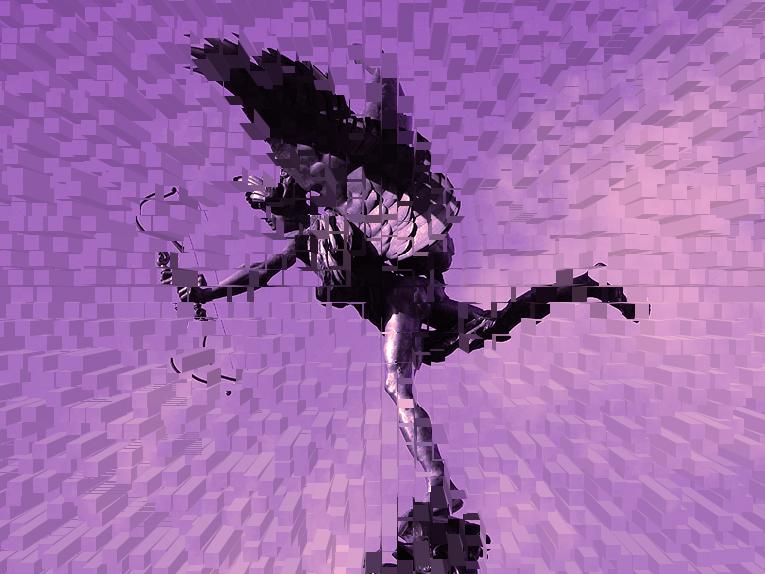Poetry & Prose : OBLIVION

OBLIVION
by Ishmael Annobil
The Sunday Dedee woke up, life had taken a turn for the worse. The years had leafed through her books and left their yellow mark. Moths lay at her altar like oblations; all upturned and shocked like shame. The plastic flowers either side of the icon offended her with their truthful colours, maybe because she had just emerged from a staid element, suffused with one long hiss. She rose to her elbows and screamed the scream of enchanted pain. No one came.
She got to her feet softly, barely clinching a foothold on the wooden floor, and pretended to pace the room like a jilted bride. The nun’s sherry she used to pretend to toast nature with stared at her from its hideout in the kitchen’s rafters. Then she remembered gaiety. ‘I need a drink,’ she thought, but she clamped down on herself immediately.
She sailed to the kitchen window to find something to distract herself with. The apple tree was still there in the backyard; only, it was now a cow’s back scratcher. The grey bovine jolted it in the dew like a chi practitioner, forcing it to abort fruit, then chased jauntily after each fruit and mauled it down with the glee of uncomplicatedness. The way its dewlap and udder swayed in the mist like a cartoon’s made Dedee giggle. She fell in love with it immediately; its nonchalance, its bold convent school kind of womanhood. She wiped the mist from the tiny window and continued to looked on.
Fog had made an idyll of things. It seemed to slow the cow’s movements and gave it a whitish patina whenever it moved. And when it broke into its wobbly sprint after an apple, it became a mirage of swirling white smoke. It seemed to smile, till one apple rolled too far downhill towards the window where its admirer stood, then its nostrils dilated like a carnivorous flower. It made to chase after the apple, but gave up immediately. The toadstools were in its way. It snorted and went back to jolting the tree, with vengeance, all the while staring back at Dedee, as if to test her will or something. Dedee remembered gaiety again. But it did not excite any craving in her this time. Gaiety merely wooed her; it gave her a sense of self; its serenade touched her.
While she cavorted with gaiety, an apple dropped on the cow’s back. But it turned slowly without alarm to look at it like a blasé mother. Dedee felt suddenly spooked by such control from an animal. It told of hidden talent; humanlike talent hidden from humans, undermining humans with its quietude, studying humans, compiling an anthropological dossier, waiting for humans to slip up and then take over. She withdrew from the window, but felt like taking a last quick look. She took the peek. The creature looked up urgently at her with quizzical eyes, as if to query her leaving without saying bye-bye. Dedee winced audibly and slid back into bed and shut her eyes tight. She shook like paper, expecting the subversive cow to crash through the walls to speak with her. That would kill her, she thought.
The long hiss took over again, but not before she heard the cowardly flight of gaiety. She had imagined gaiety to be like the commanding scent of a husband, whose unapologetic fingers, at such a moment, would stroke her in all her tender places at once, whispering velvet platitudes into her ears, banishing her fears. With its rapid defeat, however, gaiety suddenly felt more like a false lover; transient, obsequious like a domestic cat, “a waiterly gigolo”, she thought. So then she relished the hiss like one would one’s crying-shoulder. The eerie cow was gone, the wind, if any, stood still, and she was back in the element. The primordial forest. She wouldn’t need to roam it, but just let it calm her like a balm. Ambrosia. Stillness. Familiarity.
Except, this time, she was also conscious of its colour: it was purple; purple all round. This, she thought, must be the colour of nature’s logic: fate. She hated any such heavy myth, though; it irritated her. She preferred rancour. Or something simpler, like as a stolen kiss, or the cry of an infant. If purple was the only colour fate could come up with, she thought, then she didn’t really want it. “Some kaleidoscope!” she scoffed. She was, after all, an artist. She loved colour, the variegated sort that bees were drawn to. She felt sorely bereft of gaiety. She would rather have the cowardice of gaiety, any day. She must escape this purple world immediately.
She started to thrash about, disturbing the hiss, forcing it to syncopate slightly. Yet she couldn’t withdraw from it. But soon her thrashing started to make little windows in the hissing walls, letting in pellets of real sound, though she could not hear herself shout for help. Then she heard a familiar voice reaching in to her. Though warped by the tapering purple walls, she still recognised it, distinguished as it was by the ache of maternity. She remembered its sure timbre from the womb. It calmed her. She felt foetal. Mothers could be trusted to send nightmares running. So she decided, mischievously, to lay back and listen to Mother do her thing. But mother was sobbing.
A male voice comforted her briefly. It troubled Dedee not to recognise that male voice. She pricked up her ears. The purple wall dropped back swiftly. Sunlight reached her. She listened attentively, working up a slight purr on her breath and clenching her fists sweetly like a baby, to make believe she was fast asleep. Mother’s hands grabbed her shoulders and started to shake her. Dedee lay possum.
“Someone bring back my daughter from this oblivion. This treacherous sleep! Wake up Dedee! Wake up! You have missed ten good years of your good life already! Wake up!” Dedee wouldn’t budge; the news of her oblivion shocked her. She felt her mother’s hands slide away in resignation. Then there was long silence, followed by moaning and slurping. She wanted to hear the male voice again, but it didn’t say a word, it just groaned. She heard the door shut urgently. Then the moaning and groaning reached a fever pitch. Then the air smelt wrong all of a sudden. The door opened again. The male voice said bye-bye. “Kiss Dedee for me,” it said. Mother didn’t answer.
The door shut again, softly. Mother said a short prayer. Dedee wept inside. She heard Mother’s feet patter off to the kitchen. The kettle started to boil. Dedee’s lips felt parched. She remembered gaiety again and decided to sit up in bed to wait for it, to question its loyalty. She looked around her. For once, she noticed all the accoutrement of medical science around her – tubes and bleeping machinery – pinning her down with their misery. She realised she couldn’t have really walked to the kitchen before. She must have been dreaming after all. She was glad to be up. She craved her secret nun’s sherry now. She could see it leering away from the rafters, attesting to her having actually walked to the kitchen. But she decided to wait for mother first.
At length, Mother walked in, humming cheerfully over her tea like a budgerigar in spring, while her left hand struggled skittishly to fix the back of her skirt. She was oblivious to the changed current in her daughter’s room. She stopped briefly to finish her preening, as if she were about to enter a grotto. Dedee held her breath, bemused by Mother’s ironic deference towards her room after her carnality in it. She wondered how many times it had occurred during her ten-year sleep – this ritual of sin followed by worshipful innocence.
Her preening finished, Mother stopped her humming and pleated her lips together like a tiny rosebud. Then she contorted her face into agony, as if to impress a candid camera. Her starved eyes then looked up, transcendentally, to her daughter’s bed. Dedee was wide-eyed. Their eyes locked. Dedee smiled as a child. A cloud went over Mother’s eyes. Her teacup rolled under the bed, cackling like a clown.
Dedee freed herself serenely from the medical harnesses. She stepped over Mother’s limp form and went to the kitchen window to see if the cow was really there. It was. So was her father, milking it.
Illustration: Eros on the Wall (photograph) by Ishmael Fiifi Annobil
Author(s): ISHMAEL ANNOBIL


